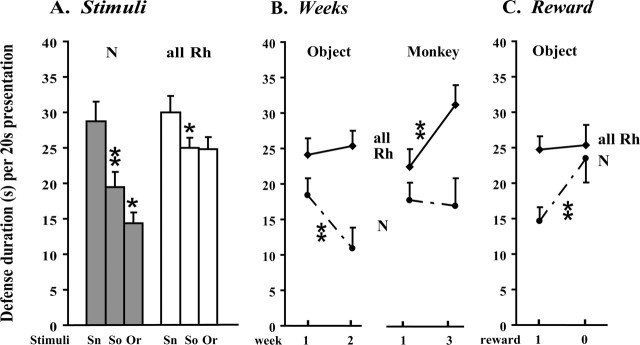Figure 2.
Memory-dependent modulations of defense in monkeys with either separate or combined entorhinal and perirhinal ablations (all Rh, n = 13) and controls (N, n = 6). A, Remote memory (before the experiment) and stimulus identification. Controls (gray bars) fear the snake (Sn) more than the social (human and monkey) stimuli (So), and the social stimuli more than the rewarded object (Or). The former down-modulation is evident, albeit less marked, in operated monkeys, but not the latter (white bars). Each bar is the average (±SEM) over three (Sn), six (So), or nine (0r) 20 s presentations. B, Long-term memory (throughout the 3 weeks). Controls show a sharp defense drop on the second week of rewarded object presentations relative to the first week, that is absent in operated monkeys. Conversely, operated monkeys show a sharp defense rise on the third weekly monkey presentation relative to the first one that is lacking in controls. Each weekly score corresponds to one (monkey) or three (rewarded object) 20 s presentations (±SEM). C, Short-term memory (within a daily session) and reward omission effect. Over the first 2 weeks of testing, omission of the reward on the fourth daily presentation of the object relative to the immediately preceding three rewarded presentations elicits a defense increase only in controls. Scores are averaged over six (reward = 1) or two (reward = 0) 20 s presentations. *p < 0.05; **p < 0.01.

